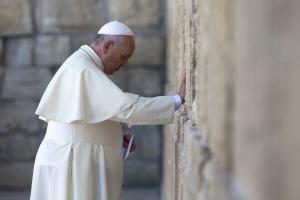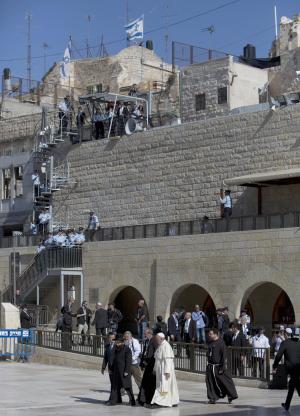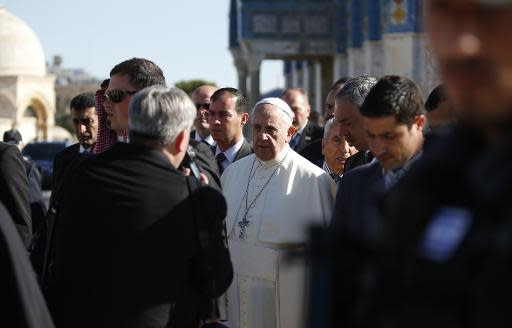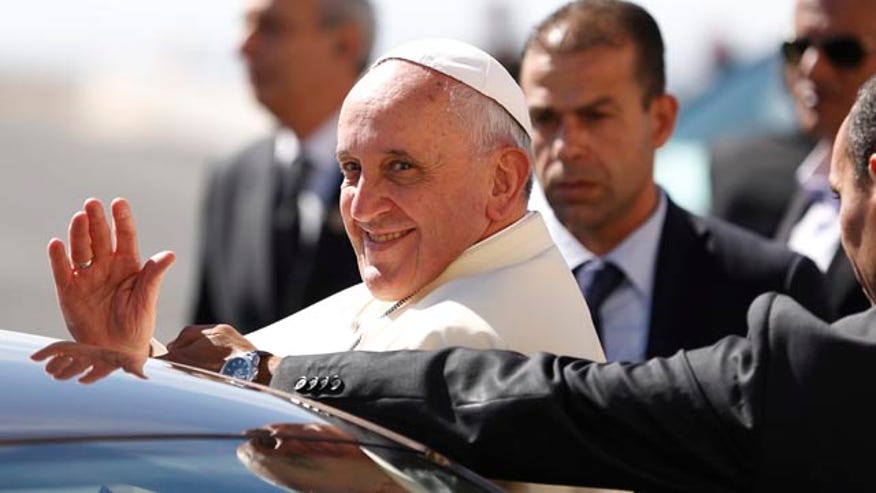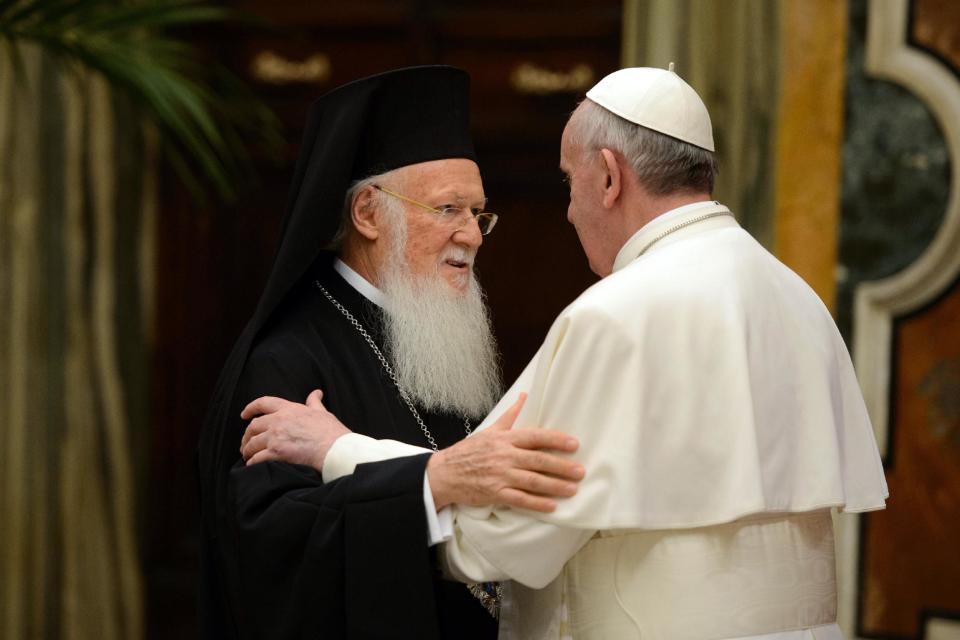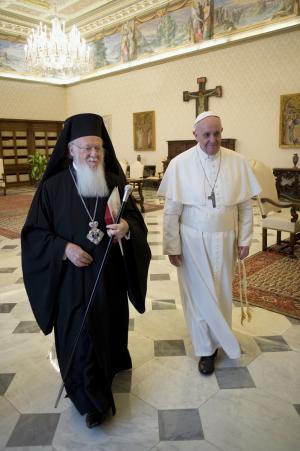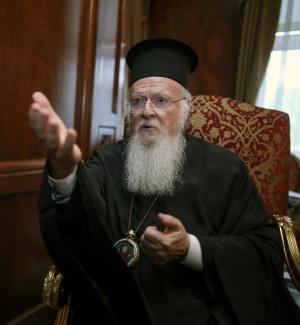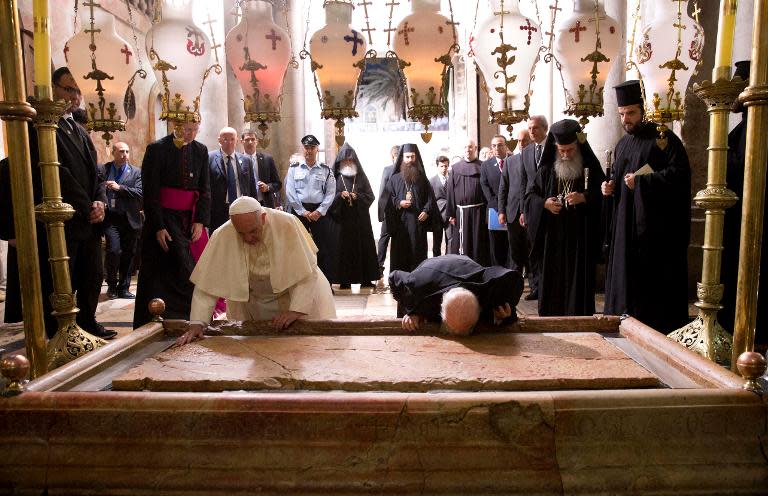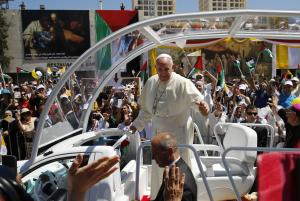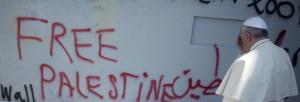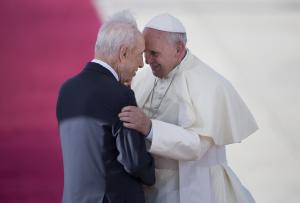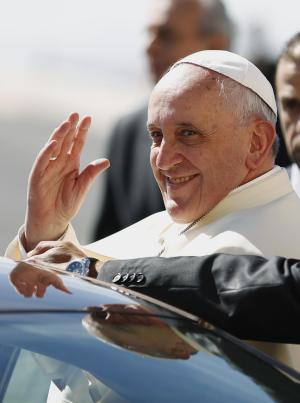 By JOSEF FEDERMAN and MOHAMMED DARAGHMEH
By JOSEF FEDERMAN and MOHAMMED DARAGHMEH
JERUSALEM (AP) — Pope Francis delivered a powerful boost of support
to the Palestinians during a Holy Land pilgrimage Sunday, repeatedly
backing their statehood aspirations, praying solemnly at Israel's
controversial separation barrier and calling the stalemate in peace
efforts "unacceptable."
In an
unscripted move, Francis arranged a meeting between the Israeli and
Palestinian presidents at the Vatican next month. The meeting, while
largely symbolic, shows how the pope has sought to transform his
immensely popular appeal into a moral force for peace.
On
the second day of a three-day swing through the region, the pope
arrived in Bethlehem, the birthplace of Christianity, before heading to
Israel for the final leg of his visit.
While Francis mingled warmly with his Israeli hosts, his trip to Bethlehem included the day's most powerful images as he expressed sympathy and solidarity with the Palestinians.
"I
am with you," he told a group of Palestinian children at a stop in
Bethlehem's Deheishe refugee camp. He also held a private lunch with
five Palestinian families who say they have been harmed by Israeli
policies.
Even the pope's
arrival in Bethlehem — by helicopter straight from Jordan — carried
important symbolic significance. Past papal visits to the West Bank have
come through Israel, which captured the territory in the
1967 Mideast
war.
Palestinian officials
hailed Francis' decision to refer to the "state of Palestine." In its
official program, the Vatican referred to President Mahmoud Abbas as the
president of the "state of Palestine," and his Bethlehem office as the
"presidential palace." He pointedly called Abbas a "man of peace."
Jubilant
Palestinians cheered Francis as he arrived in Bethlehem's Manger
Square, shouting "Viva al-Baba!" or "Long live the pope!" Giant
Palestinian flags in red, white, green and black and the Vatican's
yellow-and-white flags decorated the square, which is home to the Church
of the Nativity, built over the grotto where tradition says Jesus was
born.
"Coming to Bethlehem and
flying to Bethlehem from Jordan shows solidarity with the Palestinian
people, which is wonderful. We need that," said Samar Sakkakin, a
52-year-old Palestinian American from Canton, Michigan.
In
November 2012, the U.N. General Assembly overwhelmingly recognized a
"state of Palestine" in the West Bank, Gaza and east Jerusalem — lands
Israel captured in the 1967 war — as a non-member observer. Israel
objects to the Palestinian campaign, saying it is an attempt to bypass
negotiations.
Francis' arrival
came weeks after the latest round of U.S.-backed peace talks collapsed.
During nine months of negotiations, little — if any — progress was
made, and there are no signs of talks resuming anytime soon.
Standing alongside Abbas at a
welcome ceremony, Francis declared: "The time has come to put an end to
this situation, which has become increasingly unacceptable."
He
said both sides needed to make sacrifices to create two states, with
internationally recognized borders, based on mutual security and rights
for everyone. He urged both sides to refrain from any actions that would
derail peace.
In his remarks,
Abbas voiced his concerns about the recent breakdown in peace efforts
and lamented the difficult conditions facing the Palestinians.
Abbas
said he would welcome papal intervention. "We welcome any initiative
from you to make peace a reality in the Holy Land," Abbas said.
After
the meeting, the pope's open-roof vehicle stopped at a section of the
West Bank separation barrier, which encircles Bethlehem on three sides.
Israel says the structure is a security measure. The Palestinians say it
has gobbled up their land and stifled their economy.
Pope Francis prays at Israel's separation barrier on his way to a Mass in Manger Square
France stood up, put a hand
on the wall, bowed his head and said a short prayer alongside a section
on which "Free Palestine" is scribbled in graffiti.
In
another unscripted move, Francis issued a surprise joint invitation for
Abbas and Israeli President Shimon Peres to come to the Vatican to pray
for peace together. "I offer my home in the Vatican as a place for this encounter of prayer," he said.
The
offices of the Israeli and Palestinian presidents quickly confirmed
their acceptance, with the Palestinians saying the meeting would take
place June 6.
The invitation —
and the acceptances — were unexpected given Francis' insistence that
his three-day visit was "strictly religious" pilgrimage to commemorate a
Catholic-Orthodox anniversary.
Peres, a 90-year-old Nobel Peace
laureate, holds a largely ceremonial position, and the Vatican meeting
will be largely symbolic. But he nonetheless risks upsetting Prime
Minister Benjamin Netanyahu with the move.
Pope Francis, right, talks with Israeli President Shimon Peres, during an official arrival ceremony
Netanyahu has expressed anger with politicians that have
reached out to Abbas at a time when the Palestinian leader is
reconciling with the Islamic militant group Hamas. Israel considers
Hamas a terrorist group. Netanyahu's office declined comment.
Isaac
Herzog, Israel's opposition leader, said the pope, a close friend of
Israel, had sent a clear message to Netanyahu through the invitation.
Speaking on Channel 2 TV, Herzog said the pope was essentially saying,
"Do something. It can't go on like this."
Francis
flew to Israel's Ben-Gurion International Airport in Tel Aviv, where he
was warmly greeted by an honor guard. With trumpets blaring, the
country's top officials lined up to shake his hand as he walked a red
carpet.
Francis deplored
Saturday's deadly shooting at Brussels' Jewish Museum as a "criminal act
of anti-Semitic hatred." Two Israelis were among the dead.
He
also condemned the Holocaust as the "enduring symbol of the depths to
which human evil can sink."
Francis is to visit Israel's national
Holocaust memorial, Yad Vashem, on Monday.
Pope Francis waves upon his arrival at the West Bank town of Bethlehem on Sunday, May 25, 2014.
But the pope also lamented the dire state of Mideast peace efforts, saying the holy city of Jerusalem "remains deeply troubled."
He
called for a "just and lasting solution" so that Israelis and
Palestinians may live in peace. He said Israel deserves peace and
security "within internationally recognized borders," while the
Palestinians have a "right to live with dignity and with freedom of
movement" in their own homeland.
In
the run-up to Francis' arrival, Israel experienced a string of
vandalism attacks on churches and Vatican properties, presumably by
Jewish extremists.
Earlier
Sunday, Israeli police arrested 26 Israeli hard-liners protesting
outside a contested holy site revered by Catholics as the site of Jesus'
Last Supper and by devout Jews as the burial site of the biblical King
David.
Israeli extremists have spread rumors in recent weeks that Israel plans on turning the site over to Vatican control.
Francis
made no mention of these incidents, but expressed hope that "this
blessed land may be one which has no place for those who, by exploiting
and absolutizing the value of their own religious tradition, prove
intolerant and violent towards those of others."
In
the spiritual highlight of his visit, the pope late Sunday headed to
Jerusalem's Church of the Holy Sepulcher, where Christians believe Jesus
was crucified, buried and resurrected, to meet the spiritual leader of
the world's Orthodox Christians. Their meeting marked the 50th
anniversary of a similar meeting between their predecessors that ended a
900-year rift.
___
Associated Press writers Karin Laub in Bethlehem and Nicole Winfield and Ariel David in Jerusalem contributed to this story.





